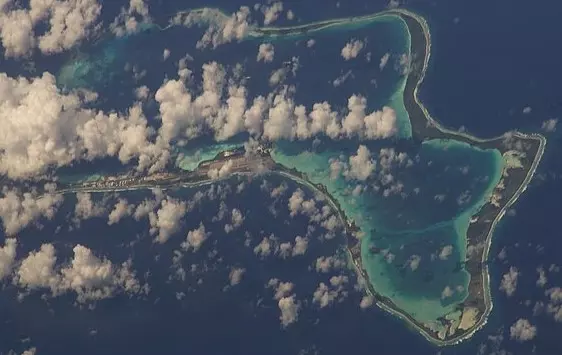
Explained: All about Chagos Islands, UK-Mauritius deal, and India’s role
Mauritian calls for sovereignty over Chagos Islands were recognised by International Court of Justice and United Nations General Assembly in 2019 and 2021

The United Kingdom announced on Thursday (October 3) that it had arrived at an agreement to hand over the Chagos Islands to Mauritius, thus bringing to an end decades of dispute over Mauritius’s claims over the archipelago.
The Chagos Islands was Britain’s last African colony, about 800 miles from Mauritius.
What led to the agreement?
Mauritian calls for sovereignty over the islands were recognised by the International Court of Justice (ICJ) and the United Nations General Assembly in 2019 and 2021.
The UK initially did not heed the UN resolutions and the court judgements that demanded the return of the Chagos Islands to Mauritius, claiming that the ICJ ruling was only an advisory opinion.
However, after 13 rounds of talks from 2022 between Mauritius and Britain, and the change of government in Britain with the Labour Party taking over from the Tories, the UK has finally agreed to hand over the islands to Mauritius.
Also Read: ‘Decolonisation of Mauritius complete’ as UK hands over sovereignty of Chagos Islands
The agreement
The agreement between the UK and Mauritius will eventually be finalised into a treaty.
Mauritius will assume sovereignty over the Chagos Islands, including the island of Diego Garcia, which plays host to a US-UK military base for navy ships and bomber aircraft.
The agreement guarantees the presence of the naval base on Diego Garcia for 99 years, with an option to renew. The UK Foreign Office said this means that the status of the base will be undisputed and legally secure.
The UK will provide Mauritius financial support to establish a trust fund for the welfare of the Chagossians.
The two countries will work together on issues like maritime security, environmental protection, human trafficking, and drugs.
A joint statement from both the governments said “the treaty will address wrongs of the past and demonstrate the commitment of both parties to support the welfare of Chagossians”.
Also Read: India sends assistance to Mauritius to help deal with oil spill
The history of Chagos Islands
The Chagossians were brought to the islands as slaves by the French from Africa and India during the 18th century. In 1814, the French ceded the territory to the UK after signing the Treaty of Paris.
The British operated plantations on the islands but could not make them profitable. This made it an expensive proposition for them to sustain the local population. The slaves were freed in 1840.
In 1968, Mauritius gained independence from the British. But the Chagos Islands was detached and was created into the British Indian Ocean Territory. This was the beginning of the territorial dispute.
The UK entered into a deal with the United States to create a military base in Diego Garcia, one of the islands in the Chagos archipelago. In the process of setting up the military base, Britain expelled about 2,000 natives between 1963 and 1973, and called them “transient workers” in order to bypass international law.
The displaced natives were expelled to either Mauritius or Seychelles, and some of them went to the UK and were eventually granted citizenship.
In 2019, a non-binding resolution was discussed in the UN General Assembly stating that Britain must give up control over the Chagos Islands. The resolution was approved in 2021, and the UK was given six months to return the islands.
However, the Boris Johnson government at the time stalled the negotiations raising concerns of Chinese influence in the region.
The ICJ issued a statement, “The UK has an obligation to bring to an end its administration of the Chagos Archipelago as rapidly as possible and all Member States must cooperate with the United Nations to complete the decolonisation of Mauritius.”
Also Read: Mauritius: India's first overseas Jan Aushadi Kendra inaugurated
Reactions to the agreement
US President Joe Biden hailed the historic agreement for being a “clear demonstration that through diplomacy and partnership, countries can overcome long-standing historical challenges to reach peaceful and mutually-beneficial outcomes”. Biden said the agreement secures the “effective operation of the joint facility on Diego Garcia into the next century”.
Mauritian Prime Minister Pravind Jugnauth said the fight for the Chagos Islands sovereignty ended in their victory “due to the country’s conviction to complete the decolonisation of our republic”.
UK’s Foreign Secretary said the deal “would strengthen our role in safeguarding global security and shut down any possibility of the Indian Ocean being used as a dangerous illegal migration route to the UK”.
However, the Conservatives in the UK have reacted angrily to the agreement, with the former foreign secretary James Cleverly saying Labour had been “weak”.
“Weak, weak, weak! Labour lied to get into office. Said they’d be whiter than white, said they wouldn’t put up taxes, said they’d stand up to the EU, said that they’d be patriotic. All lies!” wrote Cleverly on social media.
Chagossian Voices, the most important group representing the displaced natives, criticised the agreement and said that it was made without consulting the voices of the people at the centre of the issue.
Also Read: Mauritius: India's first overseas Jan Aushadi Kendra inaugurated
India’s role
The joint statement from the UK and Mauritius acknowledged India’s involvement in settling the issue, “In reaching today’s political agreement, we have enjoyed the full support and assistance of our close partners, the United States of America and the Republic of India.”
Sources said that India played a quiet but important role in the background and firmly backed the principled Mauritian position, supporting its stance on the need to do away with the last vestiges of colonisation.

